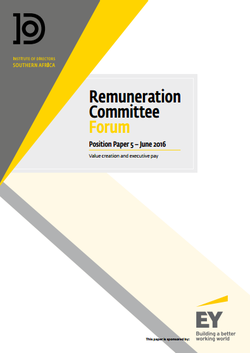 Parmi Natesan offers advice on the type of directors that should serve on the SAA board Parmi Natesan offers advice on the type of directors that should serve on the SAA board The Minister of Finance, Pravin Gordhan, has recently renewed his calls for a new board to be appointed at South African Airways (SAA). His comments come as the national carrier’s financial statements are delayed, owing to the Treasury not providing the guarantees needed to convince its auditors that it is a going concern. Minister Gordhan is quoted as stating that the guarantees will only be considered once the airline has a new board and executive team. This‚ Gordhan told a business breakfast‚ would require a “whole new board” of “credible people… with the right balance of skill and exposure”. According to Parmi Natesan, Executive: Centre for Corporate Governance at the Institute of Directors in Southern Africa (IoDSA), “The IoDSA’s Board Appraisal Benchmark Study shows that public sector boards perform less well than those in the private sector. One of the reasons for this, sited by public sector board members themselves, is that board members are often political appointees, and thus lack the necessary knowledge, skills, experience and independence to fulfil their roles adequately.” The IoDSA’s Board Appraisal Benchmark Study concluded that board composition is probably the single most important governance factor in respect of an organisation’s future success. Interviews with members of these boards indicate that key challenges include the fact that incorrect criteria are used in appointing board members, lines of accountability are not clear, and a lack of industry knowledge resulting from the high turnover of ministers, MECs and directors. Need for professional directors “When it comes to appointing new members to the SAA board, it would be wise to ensure they have the correct knowledge and skills—public-sector directors have a tough job and the company’s performance is dependent on their competence,” Natesan says. “Directors generally have such an important role to play, and the issues they face are so complex, that a new cadre of professional directors is required.” In response to this need, the IoDSA has introduced a formal professional designation for directors, the Chartered Director(SA) or CD(SA). In addition, a structured pathway has been designed to enable directors/aspiring directors to acquire the director competencies they need to complement their existing business skills whilst working towards the designation. The CD(SA) designation also enables directors to demonstrate objectively their fitness to serve on a board, and provides a vehicle for continuing professional development. “While the pool of CD(SA)s is still relatively small, the pathway and ultimate designation should be used as a benchmark for competency to serve as a director in South Africa,” says Natesan. “If SAA is to turn the corner, it needs board members with the right knowledge, skills and personal competencies; and a clear understanding of their responsibilities to the organisation, to the state and, ultimately, to the citizens.” ENDS MEDIA CONTACT: Cathlen Fourie, 082 222 9198, [email protected], www.atthatpoint.co.za For more information on the IoDSA please visit: Website: www.iodsa.co.za Twitter: @The_IoDSA LinkedIn: The Institute of Directors in Southern Africa group
0 Comments
The long-awaited update of the King Report on Corporate Governance for South Africa, King IV™, will be launched at a high-level conference at the Sandton Convention Centre on 1 November 2016. Interest in the conference is high: when online registrations opened on 6 July, the first registration was made after just three minutes. By the end of the day, 83 people had already registered along with additional confirmations from an international delegation representing 13 countries across the globe.
“King IV introduces some important updates to the landmark King III’s report. In addition, it breaks new ground by differentiating clearly between principles and practices, and linking practices to outcomes—all with a view to making implementation easier,” says Angela Cherrington, CEO of the Institute of Directors in Southern Africa (IoDSA). “Governance is ever evolving, and King IV provides closer, more practical guidance on how to integrate its principles into the way organisations do business.” The conference will be addressed by a number of prominent South African figures, including Chief Justice Mogoeng Mogoeng; Lynne Brown, the Minister of Public Enterprises; Reuel Khoza, president of the IoDSA; David Lewis, Executive Director of Corruption Watch; Thembekile Kimi Makwetu, the Auditor General; Mervyn King, the Chairman of the King Committee; and Ansie Ramalho, the King IV™ Project Lead. An international panel of speakers includes Simon Arcus, CE of the IoD in New Zealand; Heloisa Bedicks, MD of the Brazilian Institute of Corporate Governance; Stan Magidson, CEO of the Alberta Securities Commission, Simon Walker, Director General of the IoD in the United Kingdom and Peter Dehnen, CEO of the German Directors Association. Cherrington says that the IoDSA has also developed a mobile app for the conference. The app will mean that delegates can create a personalised schedule and import it into their calendars, access speaker profiles, and message speakers and other delegates. “The app will reduce the paper generated by the conference while enhancing delegates’ experience,” Cherrington says. “Other green initiatives include sourcing produce locally, using beaded rather than real flower decorations, intensive recycling and providing carbon credits for purchase by delegates.” Online registration is available on http://bit.ly/29R5Vlq until 25 October. ENDS MEDIA CONTACT: Cathlen Fourie, 082 222 9198, [email protected], www.atthatpoint.co.za For more information on the IoDSA please visit: Website: www.iodsa.co.za Twitter: @The_IoDSA LinkedIn: The Institute of Directors in Southern Africa group  The Institute of Directors in Southern Africa’s (IoDSA) Remuneration Committee Forum has released its fifth position paper called “Value creation and executive pay” on the practical measures that boards should take in order to link executive pay with the value they create for the company and all its stakeholders. “Executive pay is one the most visible and criticised aspects of corporate governance,” says Ray Harraway, Director: Remuneration Services at EY and Chair of the Remuneration Committee Forum. “I don’t think anybody really objects to high executive pay so long as it is directly linked to the value that executives create for the company and its stakeholders. However, getting the link between pay and performance right is extremely difficult, and that’s the issue this paper aims to address.” At the heart of this problem is the difficulty in understanding value creation. Before anything sensible can be said about executive remuneration, boards and their remuneration committees have to understand what, for the organisation, constitutes value—and how the company creates value. Once that is understood, the remuneration committee can begin to establish what the desired outcomes are, and what drivers are important in achieving them. A major stumbling block is that, according to 2013 research by McKinsey, only 34 percent of directors surveyed agreed that the boards they served on fully understand their companies’ strategies. Such an understanding is a prerequisite for understanding what value creation looks like and thus, ultimately, how executives should be incentivised. Overemphasis on outcomes at the expense of drivers is one of the common shortfalls of executive incentive schemes, Harraway says. Outcomes may take years to achieve, so they are an inadequate measure of executive performance over the short term, whereas drivers—those actions that lead to the desired outcome—can be better indicators of progress in the short term. To be effective, incentive schemes need to be multifaceted. Both outcomes and drivers should play a role in the design of the schemes, as should a balance of short-term financial performance and long-term sustainability. Thus, for example, while a rise in the annual share price is obviously important, it should not be at the cost of investment in R&D and training, which are vital to the company’s long-term sustainability. And profitability cannot be the sole financial measure used—the return on capital has to form part of the equation when assessing executive performance and how it contributes value creation. Parmi Natesan, Executive Director at the IoDSA and a member of the King IV drafting team, adds that one of the fundamental shifts in King IV is to make the performance/value creation aspect of governance more explicit. “Setting remuneration levels is never going to be an easy exercise, and nor will it ever be a simple matching of actions and results, so the remuneration committee will always need a certain amount of business acumen as well as discretion. Nonetheless, if the value-creation levers are well understood, the committee will be better placed to incentivise the right kind of executive behaviour,’ says Harraway. “For instance, if there is a conflict between actions that might result in lower profits in the short term but are likely to drive long-term value, the incentives should default in favour of the latter.” The paper “Executive pay and value creation pay” can be downloaded by visiting http://bit.ly/29jnAG6 ENDS MEDIA CONTACT: Cathlen Fourie, 082 222 9198, [email protected], www.atthatpoint.co.za For more information on the IoDSA please visit: Website: www.iodsa.co.za Twitter: @The_IoDSA LinkedIn: The Institute of Directors in Southern Africa group |
Archives
July 2024
Categories
All
|

 RSS Feed
RSS Feed